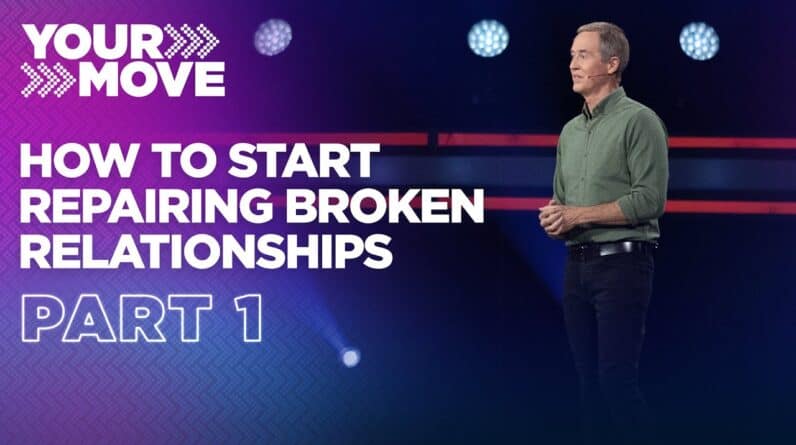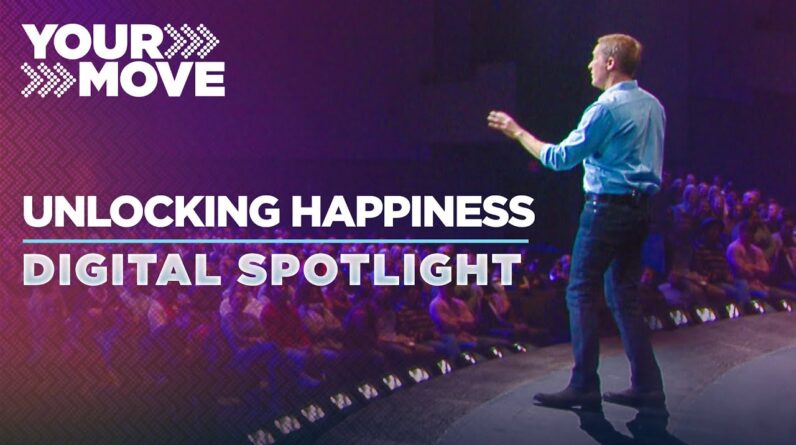Ingratitude stings. The tricky part is that ingratitude isn’t an active thing; rather, it is a lack of action. But unexpressed gratitude has the potential to leave devastating blows in relationships.
Find Your Next Move:
1. Subscribe to the channel:
2. Sign up for exclusive email content every month:
3. Dig deeper by joining one of our digital groups:
4. Get conversation starters based on this topic here:
Your Move with Andy Stanley | Give Thanks
Hi everybody welcome to your move where we help you make better decisions and live with fewer regrets. I’m andy stanley and i’ll be your guide and today we’re talking about the important but oftentimes overlooked connection between mutually satisfying relationships and gratitude.
So, if you’re building a relationship, maybe rebuilding a relationship or trying to make a current relationship better today is for you stick around.
Hi. Everybody welcome back and happy thanksgiving a few days early right, hey! I hope.
You’ll have an opportunity to celebrate with friends and family this week for several years for several years, a friend of mine, and i would get up really really early on thanksgiving morning and participate in the atlanta half marathon.
I know a lot of you have probably participated in that notice. I didn’t say we ran the atlanta half marathon some years we ran, but sometimes we just participated, but the great thing about starting off thanksgiving with a really long run is guiltless eating all day.
Long now, honestly, that was several years ago these days, it’s just guiltless eating all day long. Now, if you know anything about the history of thanksgiving, you know that it began as a really small community’s response.
Then a colonial response and ultimately, eventually our nation’s response to divine provision and divine protection, because gratitude or feeling thankful is actually a universal experience. I mean when good things happen or when we’re on the back side of a rough stretch, there’s something just intuitive instinctive in all of us.
There’s just this automatic feeling of gratitude for some folks. It’s thank goodness uh for others of us. It’s literally thank god, but thanks somebody or think something right, we’re just all instinctively thankful, though we may express it in different ways.
It’s it’s almost like. We can’t help it now. I say it’s almost like. We can’t help it because, when it comes to expressing our gratitude gratitude to each other um, it’s not always so intuitive right, it’s not always so fluid it’s not always so instinctive.
Not only can we help it oftentimes, we do help it. We withhold our gratitude and when you withhold gratitude, when i withhold gratitude, we actually create a gap in the relationship, an unfilled space, there’s unfinished business which creates a glitch in the relationship and if it goes on for too long, it actually undermines the integrity of the Relationship or to put it bluntly, few things sting, isn’t this true few things sting more than in gratitude and here’s.
Why? Because ingratitude communicates, i don’t see you. I don’t even see you, i don’t recognize you. I don’t recognize what you’ve done. I don’t recognize your effort. I don’t recognize your sacrifice and gratitude communicates.
You know what you owed me that so why would i thank you for that and gratitude stings, because it isn’t neutral, it’s the opposite of what was expected or earned or perhaps even deserve, so it hurts, which is odd, because the other person really didn’t do anything To us they just didn’t do anything now.
You thought they would hit the tennis ball back, but they just stood there and let it bounce against the fence behind him. So there are a few things more hurtful than in gratitude, but at the same time, but at the same time in this true, there are few things more uncomfortable than pointing out someone’s ingratitude right, i mean it feels kind of childish like hey.
What about a thank you every once in a while or hey you didn’t say, thank you or you never show me any appreciation. I mean who wants to say that it to say that makes us feel small and insecure, not to mention you know when you say that the other person says wait a minute.
Oh, I’m so sorry, but what we hear is i’m so sorry little baby who needs constant reassurance and affirmation right. So even asking about or bringing up the subject of ingratitude is so uncomfortable and gratitude is a strange thing because well it’s not even a thing.
It’s more, a lack of a thing, but it doesn’t always come packaged in silence or a lack of response, sometimes ingratitude is actually expressed verbally you’ve been in this situation. You do something for somebody else and instead of saying thank you, they explained that.
Well, you didn’t do it right or you chose the wrong color, but mostly in most cases, ingratitude is an absence of words, an absence of recognition of something that we’ve done that come on that deserves recognition.
The other odd thing about ingratitude is this um. It looms large when we’re the victim. I mean it’s all we can see when somebody has been ungrateful um. We can’t possibly miss it, but it’s completely invisible to the perpetrator.
I mean think about it. When we create a gap through our ingratitude. It’s all the other person can see, but we can’t see it at all, we’re clueless, which is obvious to the other party, which in the moment, makes the pain that much worse or, to put it simply, the recipient.
The recipient is always aware right, but the culprit is rarely aware. It’s so odd. Now. For me, i have to be really careful because outside my family, it’s easy for me to just write off ungrateful people and i hate to say that.
But it’s true, i mean i’m kind of i can be a one-and-done person. Gratitude goes a long way with me and in gratitude. It goes a long way with me as well, but come on. It’s a whole lot easier to extend generosity to grateful people, and my reason for bringing this up, and my reason for bringing me up.
Is this your ingratitude? Your ingratitude, which you might not even be aware of your accidental ingratitude, is leaving a mark. It’s undermining your respectability and you don’t know it. I mean the ungrateful people.
I struggle not to write off, have no idea the people who’ve written you off because of your ingratitude. You have no idea and if you’re, not family they’re, not going to tell you they just move on now.
Many years ago, when i was starting off on my quest to become a good organizational leader, i had the opportunity to meet with a pretty high profile business person for lunch in the atlanta area. Um. It was a friend of my dads.
That’s how i got the lunch. I was in my late 20s and i only remember one thing about our conversation and it was not what this gentleman intended for me to remember. In fact, i bet he doesn’t even remember saying this, but, as you know, negatives are generally stickier than positives.
I knew he had a meeting at in his office right after our lunch and we were going a little long. So i interrupted him and i said: hey hey, I know you’ve got a meeting to get to and then he interrupted me and here’s what he said and i’ll never forget it.
He said no problem, no problem, they all work for me, no problem. I don’t need to rush back, they all work. For me, this is my only takeaway from that lunch it this was. This was so offensive to me and i didn’t even know any of the other people, but when he said it, i made a decision.
I will never take the people who work with me or for me for granted. In fact, i refuse to use the phrase my people or our people when referring to people that i work with, i don’t have any people, no one deserves to be talked about or treated like they’re somebody’s people and i’m sure he didn’t mean it that way, perhaps, But it made an impression: it struck me as extremely ungrateful because he was what he was taking them for granted.
They’ll wait. They’ve got nothing better to do they owe me. I don’t owe them have you ever felt taken for granted. It’s terrible! Isn’t it it’s dehumanizing? It’s it’s one of the worst things you can experience on planet earth now, moving on, if you’ve ever been accused, think about this if you’ve ever been accused and we all have if you’ve ever been accused of being ungrateful.
If you’re, like most people, you probably got defensive and the reason you got defensive is because you felt like somebody was accusing you of not feeling something. Isn’T that true somebody says i don’t feel like you’re grateful.
I think you take me for granted and we immediately get defensive and we’re like. Oh no, but and we feel like they they’re judging us and we get defensive because we think hey. How could you possibly know how i feel, which of course is the point? They don’t know how we feel they know how they feel they feel unappreciated they feel taken for granted, but we feel otherwise.
So we push back and we get defensive and we say things like this, but i am grateful translated. I am grateful on the inside. I have grateful thoughts and feelings towards you which, while it’s true, it’s meaningless, isn’t it because – and this is the point of today’s discussion – unexpressed gratitude – think about it.
Unexpressed gratitude is actually experienced by the other person, as ingratitude unexpressed gratitude is experienced by the other person as the opposite of what we convince ourselves. We really feel, and we really think through the years i’ve met with lots of men in particular, who are super busy and find themselves a little bit alienated from their families and their children and here’s the advice i always give them.
I say: look, you love your kids in your heart, but you don’t love your kids on your calendar and the calendar is what counts. The calendar is. What connects the calendar is, what communicates what you feel and the same goes for gratitude.
It’s the expression of gratitude. It’s the expression of gratitude, not the emotion that completes the circle that closes the gap that maintains the connection or, to put it another way, gratitude and ingratitude are relationally determinative.
This is so important gratitude and ingratitude actually determine how much of you you’re willing to entrust to someone else, and it determines how much he or she is willing to entrust to you, because, when you feel taken for granted when we feel taken for granted, we instinctively It’s not a decision.
We instinctively withhold part of ourselves in order not to be hurt again gratitude and ingratitude are relationally determinative. They determine something about the relationship or think about it. This way, our hearts and you’ve experienced this.
Our hearts actually gravitate toward recognition and gratitude. It’s not a decision, it’s a response, um if you’re married or if you’re, in what you hope to become a permanent relationship. Here’s a tip here’s! This is so important.
Don’t let anyone don’t let anyone out grateful you? What I mean by that is be the most grateful person in your loved one’s life, because our hearts, their hearts gravitate toward recognition and gratitude.
Now, there’s a famous narrative from the life of jesus and uh. We talked about this about five years ago. If you were around then and every every time i read this narrative honestly, it kind of feels like the gratitude bar gets raised a little bit.
I immediately think about the people, i’m grateful for in my heart that haven’t heard it from my lips or my pen. Now luke, who thoroughly investigated everything in the life of jesus, begins this narrative like this, he says now: jesus was on his way to jerusalem and he traveled along the border between samaria and galilee, and if we had a map, i will show you this area.
This is a very remote area, sparsely populated it’s kind of in the middle of nowhere, and as he was going, the text says and as he was going into a village, ten men who had leprosy met him, um people with leprosy, they basically hovered between life and death they weren’t dead, but they couldn’t really live and worse than that, imagine they stood at a distance and they watched everybody else live their lives.
As you know, in ancient times, leprosy was considered highly contagious, uh people afflicted with leprosy, don’t experience pain, the way the rest of us do and in a culture. This is the part we can’t really understand, sometimes in a culture that required physical labor just to survive.
This often resulted in injuries that either went unnoticed or unattended to so their bodies would visibly deteriorate over time and the law the law actually required. Somebody who had leprosy to live on the outskirts of town in a designated area and anytime they came toward town or came towards civilization.
They had to warn people that they were approaching. Consequently, lepers often created their own communities, they grew their own crops and they survived the best that they could and it would come as no surprise to luke’s first century readers that a community of lepers were kind of eeking out a living in this remote borderland.
Between the predominantly jewish territory of galilee and the area inhabited mostly by samaritans now, this has nothing to do with the story, but i think it’s worth pointing out at the end of this account, we discovered that this particular community of lepers was comprised of both jews And samaritans two groups, who normally would have nothing to do with each other, for both political and religious reasons, but here’s the thing, pain, suffering and alienation, pain, suffering and alienation have a way of minimizing differences and maximizing what people have in common when people need each Other politics and religion: they are just not front burner issues, just a thought anyway.
Luke continues. He goes on and he says this. These lepers, the ten lepers they stood at a distance with their faces covered because they had to cover their faces, which sounds familiar right. They stood at a distance with their faces covered and they called out in a loud voice from a distance.
Jesus master have pity on us. I mean they’re, basically out in the middle of nowhere he’s in this little tiny village. They have apparently come into the edge of the village to get supplies. They recognize it’s jesus, they knew him by his reputation and they call out master, which was really unusual, because this was a term pretty much reserved for those who were continuous followers of jesus.
His disciples and clearly they were not but desperate times, call for desperate measures and if he could do what people said he could do, he was their only hope and the text says: luke says that when jesus saw them, when jesus saw them, he shouted out.
He shouted back to them, go go which was not really what they were expecting i mean that’s what they’d heard for years go as in go away, but here’s what jesus said jesus said: go and show yourselves to the priest, which they must have thought go and Show them what there is nothing to show and besides the priests, aren’t all that anxious to see us.
In fact, nobody is, but jesus had a triple intent here. According to the law, anyone with any kind of skin disease after being quarantined had to go to a local priest to be given the all clear before they could go back into society.
The implication was by the time you get there when jesus said go. The implication was jesus. It was saying by the time you get there when you go um when you see the priest you’re going to get the all clear, but there was even more to it than that.
Imagine this when 10 healed lepers when 10 healed lepers show up the priest would certainly ask how all ten of them were healed, and that would be an unprecedented event and it would clearly be a miracle which again would add to jesus reputation.
It would be impossible to argue that something extraordinary hadn’t happened and here’s the third thing their willingness to go before anything had changed would certainly be an expression of extraordinary faith in jesus and, if nothing changed on the way it would make fools of the lepers.
So there was a lot at stake and there was a lot behind this request to go so, if you’re in their situation, what do you do in a situation like that? It reminds me of the advice that my great-grandfather gave my father when my father was a teenager.
He said this, he said grandson. If god tells you to run your head through a brick wall, start running and trust god to make a hole, so jesus said go and they went and not because it made any sense, but because jesus told them to go – and you probably remember what happened next And as they went as they obeyed as they went, they were cleansed, they literally walked by faith.
This is a phrase we throw around a lot in the church and in christianity to walk by faith. This is literally what it means to walk by faith. They responded to the promise and the prompting of jesus before they knew the outcome.
That’s what it means to walk by faith, but then the twist in the story and the reason we’re even talking about this one of them one of these lepers when he saw he was healed. He turned around and he came back.
He turned around, he returned. He completed the loop, he filled the gap, he came back. The text says praising god in a loud voice and he literally threw himself at jesus feet and thanked him. No more social distancing.
He walked right up to jesus and fell at his feet. He was not content, he was not content to feel grateful. He demonstrated it. He expressed it and think about it as much as he was ready to get back to living among the living as much as he wanted to put all of this behind him.
He knew he had to close the gratitude loop. After all, jesus had just given him his life back, so he did what we all need to do. He went back. He went back to think the one who had enabled him to move forward.
He went back to thank the one who enabled him to move forward with his life and Luke. Looking back over the story arc of jesus life, I think he must have smiled when he penned these next four words in greek five words in english, and he talking about the leper and he was a samaritan, the implication being the other nine, probably weren’t this man.
This man had experienced alienation and discrimination on multiple levels. He was extra grateful and I think the reason for this um added seemingly unimportant detail comes to light when you read the entirety of luke’s gospel, because over and over in his gospel luke highlights jesus encounters with outsiders.
People that his first century audience would never expect. Jesus to have anything to do with, and over and over it was the outsiders who expressed the most gratitude. They were not confused about how undeserving they were their pride and their busyness did not get in the way of their effort to close the gratitude loop, especially with jesus, but this incident doesn’t end there.
Jesus asked a question: he said we’re not all ten cleansed. Where are the other nine now in the greek text? It’s interesting because the interrogative, where is actually at the end of the sentence for emphasis, here’s here’s, how it reads in the greek, literally the nine, where the nine, where are they and, of course, jesus, isn’t really expecting an answer.
He’s just making a stinging observation. Something is missing: uh someone is missing, some ones are missing, the other nine have missed the moment. The other nine have missed their opportunity. Something was missing, incomplete, unfinished open-ended.
The circle isn’t closed, but now the window to close it has closed. Now, if you’re a parent, you understand what jesus is getting at here and for those of us who can remember how our parents raised us, we understand what jesus is getting at too, when you were a kid and somebody gave you a gift and one of your Parents was standing there, they would immediately say what they would say say.
Thank you, as in right now say. Thank you. There was urgency like quick say. Thank you right now. Time is running out close the circle connect the dots – and this is jesus point. The other nine missed the moment and the moment had passed how ungrateful their their entire destiny had been changed.
Apart from jesus, apart from his intervention, they’re going to spend the rest of their lives, eking out a living in the middle of nowhere, they’ve been restored to their families and their children, they could work again, they could worship again and where are they? And when we read this story, isn’t it true? We respond the same way.
Jesus did yeah yeah. Where are those guys, but before we judge too harshly? I imagine i imagine if someone had confronted the other nine about their apparent lack of ingratitude their apparent lack of gratitude.
I should say i imagine they would have been quick to respond with like what we’re not ungrateful. We are so grateful. Our hearts are filled with gratitude. I mean the other nine had to have felt it right.
The problem is like us: sometimes they didn’t express it, and jesus like us was baffled and he asked has no one returned. Has no one returned to give praise to god, except this foreigner only one returner and again, the question is a rebuke, and it also implies that the other lepers may have been galileans like jesus rather than samaritans.
Then he turns back to the one who returned and he says once again rise and go, and of course this is the second time he’s told him to go, but this time there would be no reason for him to return. The circle was complete and then this final statement, your faith, has made you well so as we wrap up, i want to make three quick observations to carry with us throughout this next week.
The first one we’ve already touched on that unexpressed gratitude, unexpressed gratitude, communicates in gratitude. There is no neutral ground and our feelings don’t count because our feelings don’t connect our feelings of gratitude.
Don’t close the loop worse worse, the gratitude we feel think about this. The gratitude we feel, but don’t express, is felt by the other person as the opposite of what we’re feeling we feel grateful. They feel unappreciated taken for granted and – and this is important, telling other people how grateful we are for someone else doesn’t count either.
Even if that person overhears hears us and here’s here’s, why i say that and if you’re married um, you know, there’s a tendency to do this. Sometimes right bragging on your spouse to other people in front of your spouse, but never bragging on your spouse to him or to her privately.
Never expressing gratitude directly to them does not close the loop, in fact, in some cases, in some instances expressing gratitude to other people about something rather than to that person can actually be insulting.
Second thing: is this: ingratitude feels like rejection ingratitude feels like rejection over time. Unexpressed gratitude has the same effect on people in a relationship as rejection. It creates it creates a gap again, our hearts gravitate toward acceptance, real or imagined appreciation feels like acceptance.
So if you want the heart of your child or your spouse or an employee or associates, if you want their heart express gratitude, you want to be surrounded by people who just do what they have to do to get by withhold it.
Take them for granted. They get a paycheck, it’s my husband she’s, my wife. I mean this is what they signed up for. This is what they’re supposed to do. You may keep their hands, but you will never have their hearts.
They may stick around, but the relationship will eventually be void. Of intimacy last observation is this unexpressed gratitude. Unexpressed gratitude may indicate an inflated view of self and here’s why i say that the message of ingratitude is this.
I could have done this without you, so i don’t really owe you anything. Isn’t it true that arrogance and ingratitude are generally found under the same rock i mean arrogant, people are generally ungrateful, people and ungrateful people usually come across as arrogant.
So i want you to be really honest for just a moment is expressing your gratitude. Difficult for you is expressing gratitude difficult for you. Are you more comfortable pointing out how something could have been better rather than recognizing how good it actually is? If so, have you ever done any work digging around trying to figure out why you’re kind of wired that way, if not i’ll, give you a starting point, here’s a hint gratitude gratitude feels like an admission of weakness.
I mean it makes you feel like you may not have been able to accomplish what you’ve accomplished without help guess what you couldn’t in the wake of your progress in the wake of your success in your rear view, mirror professionally academically financially relationally athletically are dozens of People who facilitated your progress, who facilitated your success and acknowledging their role, is not weakness.
It’s maturity. It’s evidence, you’ve! Let go of an inflated unhealthy sense of independence. Gratitude is evidence that you have life improper perspective. You would not be where you are without the support and the help of other people.
You do actually owe them a debt of gratitude and that’s, okay, so back to luke’s account for just a moment. Let’s be the one, let’s be the one rather than the nine. Let’s decide, let’s make up our mind, to be like the one who went back to thank the one who enabled him to move forward.
Why not make it the habit of our lives to go back to the people? Who’ve allowed us to move forward. So here’s a question who helped you move forward who helps you move forward? Have you thanked them recently? I mean sure you pay them, i’m sure they married you, I’m sure it’s your mom right, but have you expressed your gratitude lately? You may feel it when you think about it, but have you expressed it and if not, why not could it be? You are in fact more like the nine than the one that you took.
What was given you got distracted by the new opportunity, the new freedom, the new recognition, and then you just went on your merry way without circling back to say. Thank you. I mean, if somebody told your story or when somebody tells your story, will you be the story of the one or the story of the nine and here’s some good news you get to decide, but you decide that story.
One expression of gratitude at a time, gratitude that we feel, but don’t express, is simply ingratitude by another name. So, let’s close the loop right, let’s get in the habit of circling back, let’s be returners, let’s decide today to be the one hey thanks so much for watching.
If you enjoyed this video, please make sure you check out the links on your screen for what to watch next and check out the description below where we are going to provide you with free resources designed to help you make better decisions and live with fewer regrets.
And again, thanks for watching







